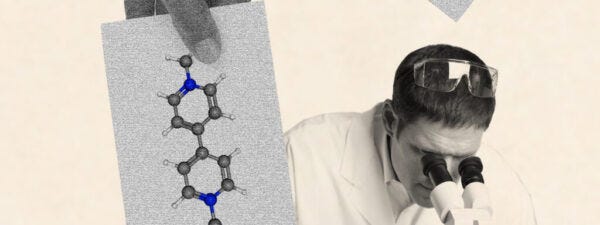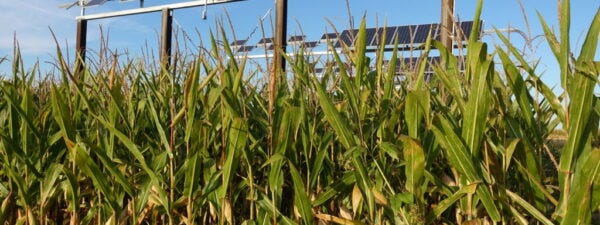Must-read recap: The New Lede's top stories
A battle over science amid calls for weed killer ban, 'countermarketing' videos could reduce demand for junk food, and Midwest farmers turn to solar energy.
Amid calls for ban on weed killer linked to Parkinson’s, a battle over science
When US regulators issued a 2019 assessment of the widely used farm chemical paraquat, they determined that even though multiple scientific studies linked the chemical to Parkinson’s disease, that work was outweighed by other studies that did not find such links. Overall, the weight of scientific evidence was “insufficient” to prove paraquat causes the brain disease, officials with the US Environmental Protection Agency (EPA) declared.
The EPA reiterated its assessment in a 2021 report. The agency said after extensive analysis of numerous factors, including concerns about Parkinson’s risk, it determined farmers could safely continue to apply the weed killer across millions of US acres to help in the production of soybeans, corn, cotton and an array of other crops.
The determination has been significant for Syngenta, the longtime maker of paraquat weed killers. The company is facing calls in the US for a paraquat ban, as well as more than 2,000 legal claims brought by farmers and others alleging they developed Parkinson’s disease because of their exposure to paraquat.
Syngenta cites the EPA assessment of the science on paraquat in defense of the pesticide, and says scientific research “does not support” a causal relationship between the chemical and the disease. On a Syngenta-run paraquat information website, the company highlights several studies it says also backs that position, including many conducted by company scientists or by outside scientists who received company funding for their work.
Last week the Guardian and The New Lede reported that internal corporate records show Syngenta had knowledge of science linking paraquat to Parkinson’s decades ago but sought both to refute the evidence with various secret tactics. The documents are available at the Paraquat Papers Media Library.
US farmworker, health and environmental advocacy groups say in contrast to the corporate science, research conducted by independent scientists provides abundant evidence of paraquat’s ability to cause Parkinson’s and other health dangers, and the EPA is improperly discounting that body of research.
More than 50 groups have called for the US to follow the lead of dozens of other countries in banning paraquat. The Michael J. Fox Foundation for Parkinson’s Research submitted a petition to the EPA with 107,000 signatories calling for a ban. The foundation cited a study that found people exposed to paraquat in their teens or as young adults had an increased Parkinson’s risk of 200 to 600 percent, depending on the overall exposure. (Read the rest of the story.)
Video ‘countermarketing’ an help cut demand for unhealthy food, study finds
Viewing 45-second videos that explain common misperceptions about toddler milks and fruit drinks reduced caregivers’ intentions to serve these sweetened beverages to their young children, according to a study published today in the American Journal of Public Health.
The study’s findings suggest that countermarketing messages designed to illuminate problematic marketing techniques could reduce demand for unhealthy foods.
“We were delighted at the findings,” said Frances Fleming-Milici, a researcher with the Rudd Center for Food Policy & Health at the University of Connecticut and an author of the study. “We’re hoping that we have an opportunity to see effects on actual behavior and long-term behavior.”
“There isn’t a lot of research in countermarketing in the area of highly processed food, junk food,” said Chris Palmedo, an associate professor at the City University of New York School of Public Health. “[The study] confirms the gradual progress that research is making in this area.”
Previous research suggests many parents do not realize what they are really buying when they purchase toddler milks and kids’ fruit drinks. Popular fruit drinks often contain less than 10% juice and are packed with added sugars and diet sweeteners. Health claims on toddler milks, which are also sweetened, are not backed by science.
The American Academy of Pediatrics advises giving children under five mostly water and plain milk to drink, stating that sugar-sweetened beverages are “detrimental to child health,” artificial sweeteners’ health effects on kids are “not well-understood,” and toddler milks are “unnecessary for most children and provide no nutritional benefit over a healthy, balanced eating plan.”
“Marketing is very confusing,” said Fleming-Milici. “When you hear nutrition education, the advice is often what you want to follow. But when you go out into the world and are purchasing a product, the messages you’re receiving can really confuse you and products appear healthy that are not.” (Read the rest of the story.)
Across the Midwest, farmers are turning to solar to boost profits
In a corner of southwestern Wisconsin, in a town called Eden, Bob Bishop spends his days farming land that has been in his family since the 1940s. He manages about 2,000 acres— some is pasture for his cattle, some is seeded with corn and soybeans. But 40% of his acreage, as he likes to say, will soon be farming the sun.
Under a 25-year lease to a large solar project called the Badger Hollow Solar Farm, Bishop has agreed to the installation of solar panels across hundreds of acres of land he previously used to grow crops. The project, which is owned by energy companies Invenergy and Madison Gas & Electric, is projected to total 3,500 acres in all and generate enough energy to power more than 77,000 homes. The developers say landowners will collect an estimated $59 million from leasing their property to the project.
In agreeing to set aside some of his land for solar energy production, Bishop is one of an increasing number of farmers in the Midwest looking to solar as a way to add to – or replace – money made growing crops, and potentially help fight climate change at the same time.
The moves are triggering some controversy, as critics say filling large swaths of land with massive installations of solar panels is unsightly and inhibits needed food production.
But advocates say using farmland to harness a clean, renewable energy source is a critical move in the face of harmful climate impacts. The Office of Energy Efficiency and Renewable Energy (EERE), a part of the US Department of Energy, says that solar energy has an important role in cutting greenhouse gas emissions, improving air quality and reducing the strain on water resources that otherwise are tapped for traditional energy production.
Bishop said he considers the transition of his land to solar production as a welcome move. His land will produce far more usable energy per acre than it would if he was still growing corn for ethanol, Bishop said. And while growing corn requires regular management and costly inputs to control weeds and pests, solar panels require little maintenance.
“It’s all revenue,” said Bishop. (Read the rest of the story.)




